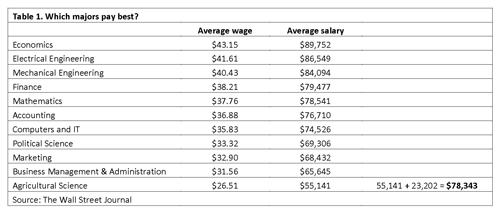It seems like agriculture majors just can't catch a break. Last year, The Daily Beast (an online news information site) listed "agriculture" as their third most useless major. Also on their list were horticulture (2) and animal science (20). We rebuked their "findings" in a blog ("Useless majors" aren't so useless) later last year.
But just last week, another site was putting us down again. This time, Career Cast called dairy farming the second-worst job out there (here's a link to the full article, "The 10 worst jobs of 2012"). While some dairy farmers might agree, they judged it on five categories: work environment, stress, physical demands, hiring outlook, and income. They might be right-on in a few of the categories, but let's dig deeper into the perception of income.
A different approach
The Wall Street Journal looked at majors in a different light yesterday. We found their comparison, based on a wide-ranging study from Yale University, much more "fair" to the majors involved. The full article is called "Which college majors pay best?" but we wanted to take it one step further.

By sorting the jobs by average wage, agricultural science ends up number 16 on the list of 24. But for the sake of argument, let's assume that 80 percent of jobs are in urban areas (the 2000 U.S. Census says 79 percent of our population is urban). The vast majority of our jobs are in urban and suburban areas. Let's also assume you want an agricultural science job in rural America. Now, how do we stack up?
We picked five dairy-area cities with no scientific basis and compared them to larger cities, or known higher-income suburbs, using the cost-of-living adjuster at BestPlaces.net. On average, our comparisons inflated salaries $23,202, to a level where agricultural science was just outside the top five majors listed in The Wall Street Journal's article.

While our comparisons are in no way scientific, the added $23,202 to the average rural salary puts these rankings in perspective. Of course, this doesn't add in the quality-of-life adjustments like a lack of stressful commute, working with your family, and feeding the world. What do you think? Are we making what's dreadful sound cheery, or are we a secret years in the making?
But just last week, another site was putting us down again. This time, Career Cast called dairy farming the second-worst job out there (here's a link to the full article, "The 10 worst jobs of 2012"). While some dairy farmers might agree, they judged it on five categories: work environment, stress, physical demands, hiring outlook, and income. They might be right-on in a few of the categories, but let's dig deeper into the perception of income.
A different approach
The Wall Street Journal looked at majors in a different light yesterday. We found their comparison, based on a wide-ranging study from Yale University, much more "fair" to the majors involved. The full article is called "Which college majors pay best?" but we wanted to take it one step further.

By sorting the jobs by average wage, agricultural science ends up number 16 on the list of 24. But for the sake of argument, let's assume that 80 percent of jobs are in urban areas (the 2000 U.S. Census says 79 percent of our population is urban). The vast majority of our jobs are in urban and suburban areas. Let's also assume you want an agricultural science job in rural America. Now, how do we stack up?
We picked five dairy-area cities with no scientific basis and compared them to larger cities, or known higher-income suburbs, using the cost-of-living adjuster at BestPlaces.net. On average, our comparisons inflated salaries $23,202, to a level where agricultural science was just outside the top five majors listed in The Wall Street Journal's article.

While our comparisons are in no way scientific, the added $23,202 to the average rural salary puts these rankings in perspective. Of course, this doesn't add in the quality-of-life adjustments like a lack of stressful commute, working with your family, and feeding the world. What do you think? Are we making what's dreadful sound cheery, or are we a secret years in the making?








